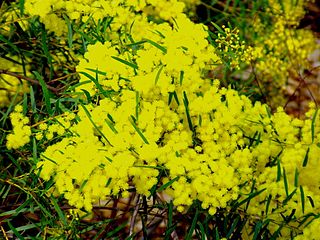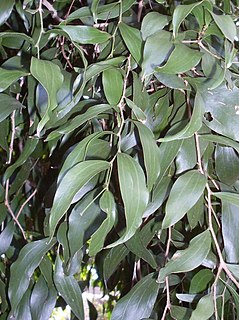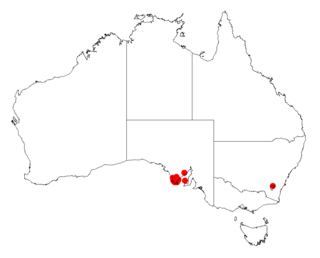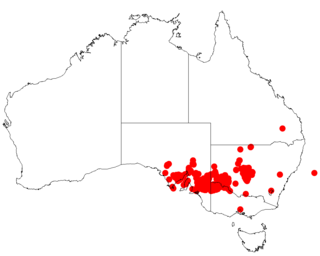
Acacia fimbriata, commonly known as the fringed wattle or Brisbane golden wattle, is a species of Acacia that is native along much of the east coast of Australia.

Acacia bakeri, known as the marblewood, white marblewood, Baker's wattle or scrub wattle, is one of the largest of all acacias, growing to 40 m (130 ft) tall. It is a long-lived climax rainforest tree from eastern Australia. Unlike most acacias, fire is not required for seed germination. This tree is considered vulnerable to extinction. Its former habitat is lowland sub tropical rainforest which has been mostly cleared in the 19th and 20th centuries.

Acacia jibberdingensis, also known as Jibberding wattle or willow-leafed wattle, is a shrub or tree belonging to the genus Acacia and the subgenus Juliflorae that is endemic to Western Australia.

Acacia basedowii, commonly known as Basedow's wattle, is a shrub belonging to the genus Acacia and the subgenus Phyllodineae endemic to arid parts of central Australia.

Acacia nigripilosa is a shrub belonging to the genus Acacia and the subgenus Phyllodineae that is endemic to Western Australia.

Acacia prainii, commonly known as Prain's wattle, is a shrub or tree belonging to the genus Acacia and the subgenus Phyllodineae endemic to Australia.

Acacia validinervia also commonly known as nyalanyalara, nyala nyala, alumaru or blue wattle, is a shrub of the genus Acacia and the subgenus Phyllodineae endemic to arid areas of inland Australia.

Acacia sclerophylla, commonly known as the hard-leaf wattle, is a shrub of the genus Acacia and the subgenus Plurinerves and is endemic to southern parts of Australia.

Acacia amoena, commonly known as boomerang wattle, is a shrub belonging to the genus Acacia and the subgenus Phyllodineae that is native to parts of eastern Australia.

Acacia alleniana is a shrub or tree belonging to the genus Acacia and the subgenus Phyllodineae endemic to northern parts of Australia.

Acacia gillii, commonly known as Gill's wattle, is a shrub belonging to the genus Acacia and the subgenus Phyllodineae that is native to parts of southern Australia.

Acacia hamiltoniana, commonly known as Hamilton's wattle, is a shrub belonging to the genus Acacia and the subgenus Phyllodineae that is native to parts of eastern Australia.

Acacia pilligaensis, commonly known as Pillaga wattle or pinbush wattle, is a tree or shrub belonging to the genus Acacia and the subgenus Phyllodineae native to eastern Australia.

Acacia wilhelmiana, commonly known as dwarf nealie, Wilhelmi’s wattle and mist wattle, is a shrub belonging to the genus Acacia and the subgenus Plurinerves native to the mallee region of central and eastern Australia.

Acacia gracilifolia, commonly known as graceful wattle, is a shrub belonging to the genus Acacia and the subgenus Plurinerves native to a small area of central southern Australia.

Acacia kettlewelliae, commonly known as buffalo wattle, is a tree or shrub of the genus Acacia and the subgenus Phyllodineae that is endemic to south eastern Australia.

Acacia kybeanensis, commonly known as kybean wattle or kybeyan wattle, is a shrub of the genus Acacia and the subgenus Phyllodineae that is endemic to south eastern Australia.

Acacia linearifolia, commonly known as stringybark wattle or narrow-leaved wattle, is a shrub or tree of the genus Acacia and the subgenus Phyllodineae that is endemic to eastern Australia.

Acacia mabellae, commonly known as Mabels's wattle or black wattle, is a shrub or tree of the genus Acacia and the subgenus Phyllodineae that is endemic to eastern Australia.

Acacia rhigiophylla, commonly known as dagger-leaf wattle, is a shrub belonging to the genus Acacia and the subgenus Juliflorae that is native to southern Australia.



















